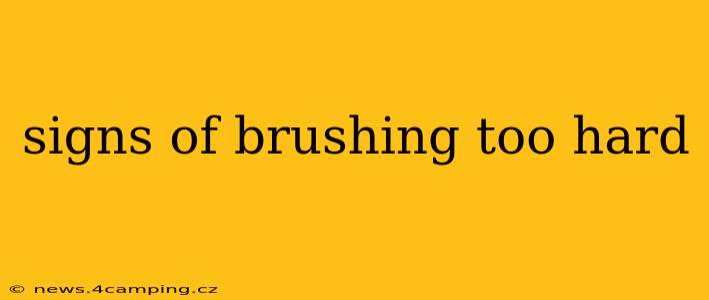Brushing your teeth is crucial for maintaining good oral health, but overzealous brushing can do more harm than good. Brushing too hard can lead to a variety of problems, from gum recession and sensitivity to enamel erosion and even tooth loss. Knowing the signs is the first step towards protecting your smile.
What are the Signs of Brushing Too Hard?
The most noticeable signs often appear in your gums and teeth themselves. Here's what to watch out for:
-
Bleeding Gums: This is perhaps the most common and obvious sign. If your gums bleed frequently while brushing, it's a strong indicator that you're being too aggressive. Healthy gums shouldn't bleed regularly.
-
Receding Gums: Over time, harsh brushing wears away the gum tissue, causing it to recede. This exposes the roots of your teeth, making them more sensitive and vulnerable to decay. You might notice your teeth appearing longer than they used to.
-
Sensitive Teeth: If your teeth are unusually sensitive to hot, cold, or sweet foods and drinks, it could be due to enamel erosion caused by aggressive brushing. The protective enamel layer is thinning, leaving the dentin (the layer beneath) exposed.
-
Worn Tooth Enamel: In severe cases, you might even notice visible wear on the enamel. This can appear as a shiny, smooth, or slightly translucent area on your teeth. Enamel doesn't regenerate, so this damage is permanent.
-
Gum Inflammation (Gingivitis): Persistent inflammation and redness of the gums can be a sign of gingivitis, often exacerbated by aggressive brushing. This is because forceful brushing damages the gum tissue, making it more susceptible to infection.
How Can I Tell if I'm Brushing Too Hard?
It's not always easy to self-assess your brushing technique. Here are some tips to help you determine if you're applying excessive pressure:
-
Pay Attention to Your Technique: Are you scrubbing back and forth with a lot of force? This is a common culprit. Try to use gentle, circular motions instead.
-
Check Your Toothbrush: Is the bristle wear pattern significant and uneven? If your toothbrush bristles are frayed or bent out of shape after just a few uses, it's a clear sign that you're brushing too hard.
-
Ask Your Dentist: Your dentist can visually assess your gums and teeth for signs of damage. They can also provide personalized advice on brushing technique.
What Should I Do If I'm Brushing Too Hard?
If you suspect you're brushing too hard, take these steps:
-
Switch to a Softer Toothbrush: Use a toothbrush with soft or extra-soft bristles. These are gentler on your gums and enamel.
-
Use a Gentle Brushing Technique: Focus on gentle, circular motions, rather than harsh scrubbing.
-
Be Mindful of Pressure: Try to brush with the lightest pressure possible while still effectively removing plaque.
-
See Your Dentist: Regular dental checkups are essential for early detection and treatment of any gum or enamel damage.
Frequently Asked Questions (PAA) about Brushing Too Hard:
How do you know if you are brushing your teeth too hard?
As discussed above, look for signs like bleeding gums, receding gums, sensitive teeth, worn tooth enamel, and gum inflammation (gingivitis). These are all clear indicators of excessive brushing pressure.
What happens if you brush your teeth too hard?
Brushing too hard can lead to gum recession, enamel erosion, tooth sensitivity, and gingivitis. In severe cases, it can contribute to tooth loss.
Can brushing too hard damage your teeth?
Yes, it absolutely can. The abrasive action of a toothbrush combined with excessive pressure can wear away enamel, leading to permanent damage.
How hard should you brush your teeth?
You should brush your teeth with the gentlest pressure possible that is still effective at removing plaque. Think "gentle circles," not "vigorous scrubbing."
What is the best way to brush your teeth?
The best way to brush your teeth involves using a soft-bristled brush, employing gentle circular motions, and brushing for a full two minutes, twice a day.
By being mindful of your brushing technique and paying attention to the signs, you can protect your smile and maintain healthy gums and teeth for life. Remember, gentle is best!
